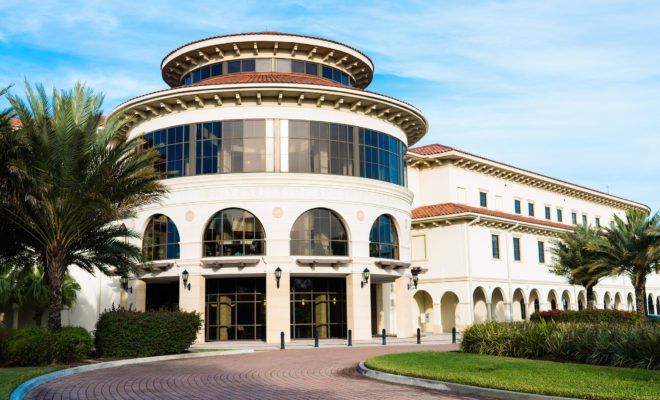
Feature
Becoming One USF
The Continuing Development of the Sarasota-Manatee Campus
By Shawn Ahearn
It’s been an extraordinary year of accomplishment at the University of South Florida as faculty, staff and students at USF’s three campuses have overcome many of the challenges associated with the consolidation of its three campuses – while managing the COVID-19 pandemic.
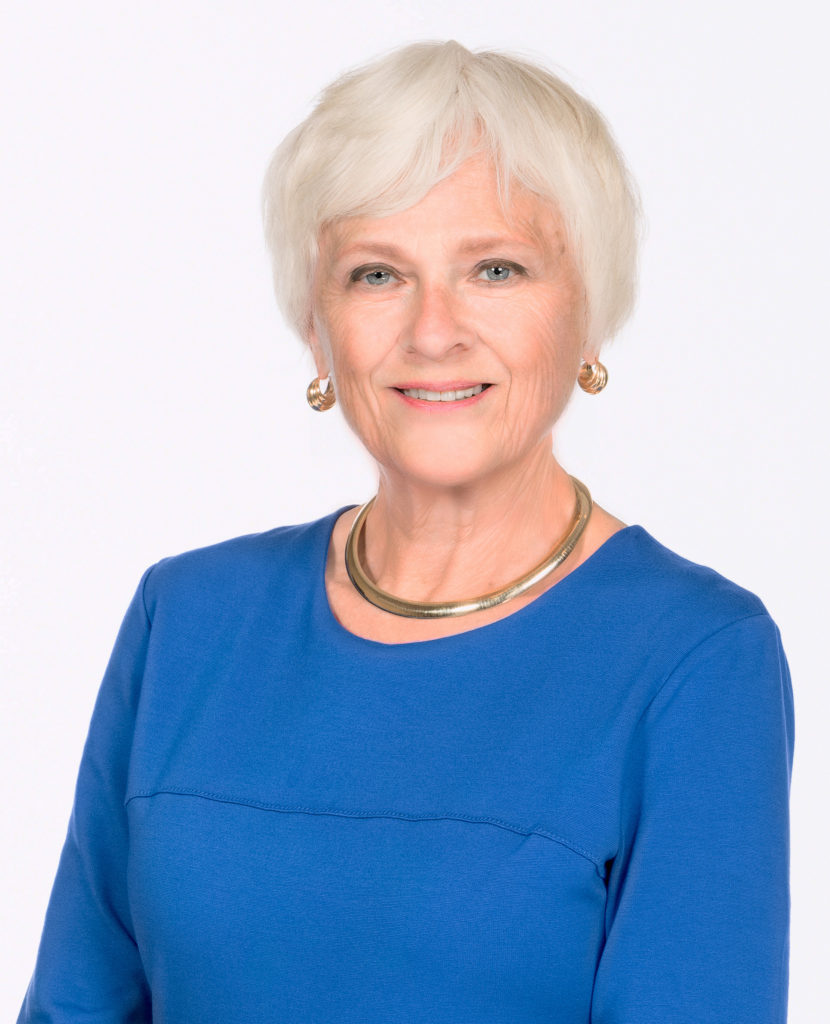
Back in the spring of 2018, the Florida legislature passed a law requiring the three University of South Florida campuses in Sarasota-Manatee, St. Petersburg and Tampa – that had operated under independent academic accreditation for nearly a decade – to consolidate into one new USF by July 1, 2020.
Dr. Karen Holbrook, who in 2018 was the newly appointed regional chancellor of the USF Sarasota-Manatee campus, embraced the challenge of leading the development of a new university, together with other USF and community leaders, that provides boundless opportunities for students, faculty, alumni and the local communities.
BRINGING THE CAMPUSES TOGETHER AS ONE
Aligning a multitude of academic programs and student support services to meet the mandates of both Florida law and the requirements of USF’s accrediting body, the Southern Association of Colleges and Schools Commission on Colleges (SACSCOC), was a daunting process.
USF immediately formed task forces and working groups that included administrators, faculty, staff, alumni and community leaders; a consultant was hired to help guide the process and provide structure to the countless deliberations that would take place during the next two years.
“One of our greatest challenges was melding the three distinct cultures of our campuses while retaining our unique identity,” said Holbrook. “The size of the Sarasota-Manatee campus enables us to provide an intimate and personalized educational experience. Professors and support staff know our students by name and engage regularly to help them achieve their aspirations. We want to retain this culture within the new One USF.”
MEETING ACCREDITATION CRITERIA
A SACSCOC requirement for accreditation is having unified admissions standards and comparable academic programs on each campus fall under the same college with the same criteria for courses and graduation. Previously, for example, there were three distinct colleges of business; with consolidation, all became part of the Muma College of Business.
“Becoming part of Muma creates more opportunities for our students to elect an expanded array of courses and make more connections with the business community throughout the region,” said Holbrook. “We can expand our newer programs in risk management and insurance, cyber security, and hospitality and tourism management program.”
With consolidation came uniform criteria for tenure and promotion that previously were different on each campus. There are now greater expectations for the faculty to build highly successful research programs.
“Consolidation required a reorientation of faculty who had allegiance to working within one campus,” said Holbrook. “Now, they need to fit into a consolidated college where they have new colleagues with whom to collaborate. Our faculty and staff seem to be adapting very well to these new environments.”
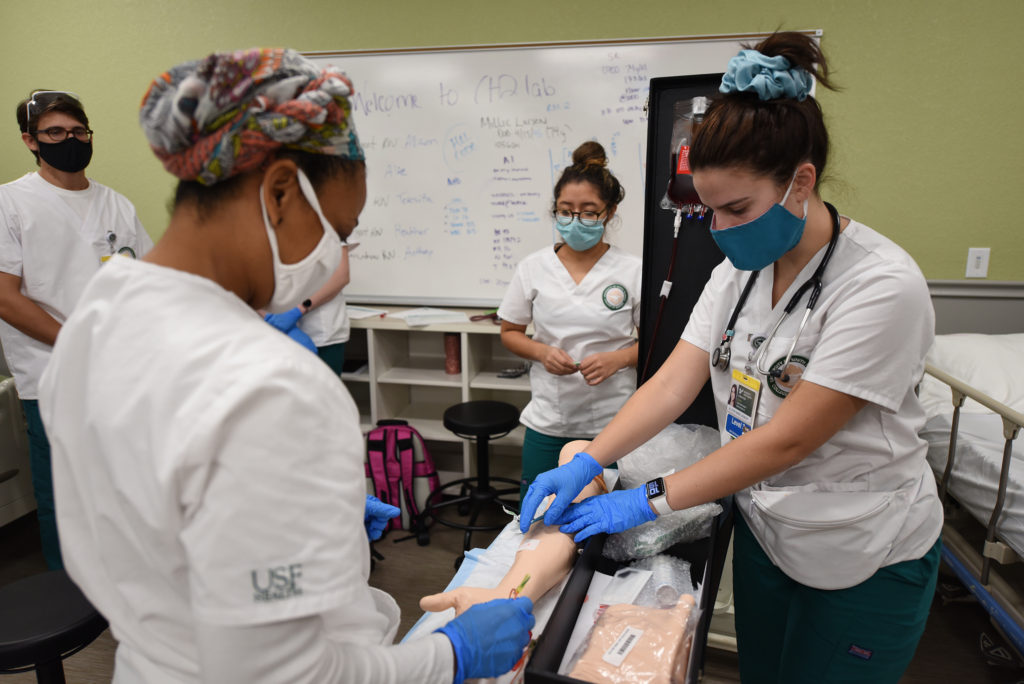
BENEFITS AND OPPORTUNITIES OF ONE USF
Consolidation provides students access to a broader spectrum of coursework and academic programs on each of the campuses as the university strives to help meet the community’s workforce needs. For example, the Sarasota-Manatee region must address the critical shortage of well-trained nurses in area facilities.
A tangible benefit of consolidation occurred in January of 2019 when the first cohort of 30 nursing students began a new Accelerated Second Degree in Nursing Program on the Sarasota-Manatee campus in collaboration with the USF Health College of Nursing. All 30 students enrolled in the 16-month program will graduate in May and enter the workforce; most plan to stay in the region. Forty new students will join the program this spring as the second cohort.”
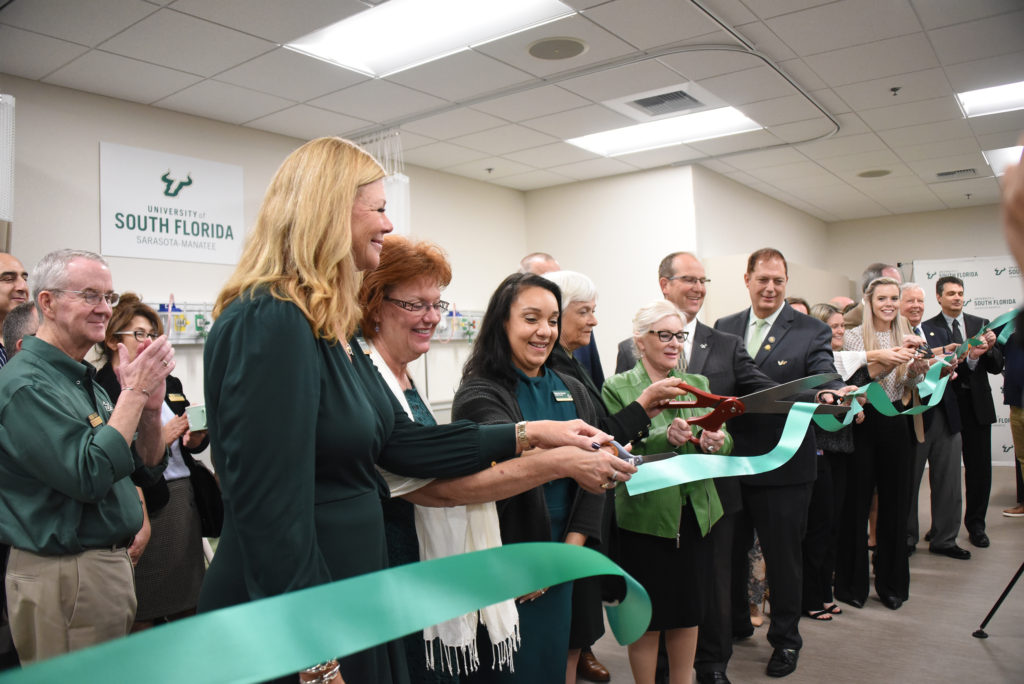
ENHANCING RESEARCH
The third edition of the USF Sarasota-Manatee campus Research Magazine was published in October, highlighting the impressive range of research activities and accomplishments occurring at the campus.
This year’s cover story centers on the work of Jessica Grosholz, and her team’s research in collaboration with Sarasota-based Selah Freedom, a nationwide anti-sex trafficking organization. Their on-going research offers crucial feedback about the organization’s training programs for awareness, prevention, residential and outreach services.
In addition to the magazine, national media outlets such as “The Conversation,” a web site that publishes stories about innovative research and is used by other national media outlets as a source, picked up several stories from Sarasota-Manatee campus this year. A story on global tourism by Faizan Ali and Cihan Cobanoglu appeared in several prominent news outlets such as “Forbes” and the “Chicago Tribune” among others.
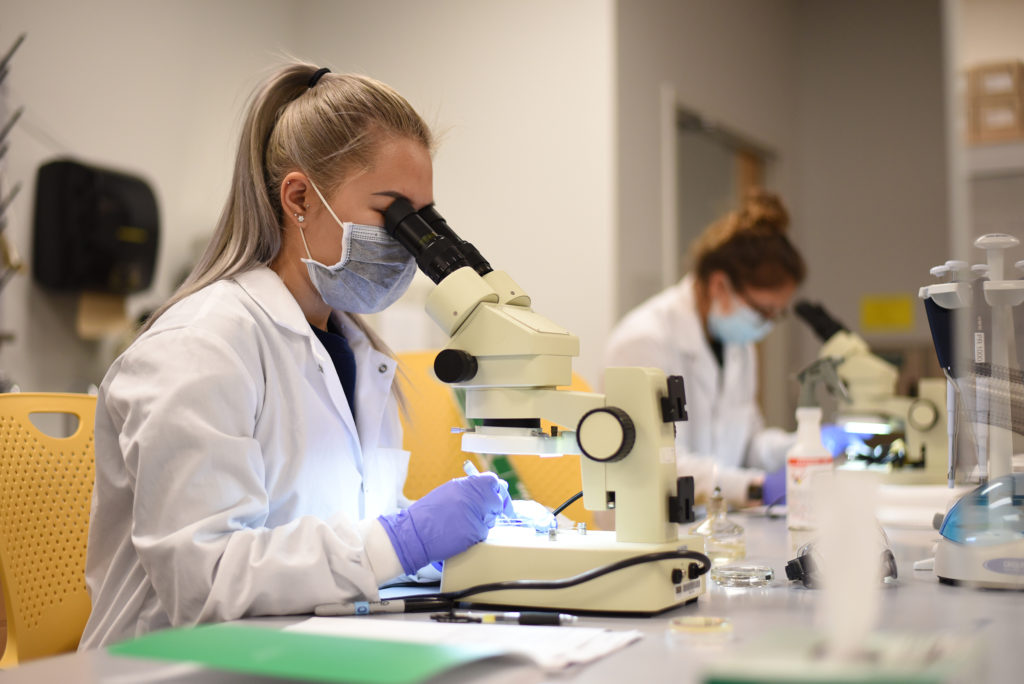
“The expanded research collaborations and the heightened level of recognition and exposure are important benefits of consolidation,” said Holbrook. “Faculty want to work at a university that is well regarded with highly engaged colleagues and provides resources to help them accomplish their research goals.“
CONNECTING THE CAMPUSES & COMMUNITIES
The USF Sarasota-Manatee campus senior leadership team has engaged in many discussions with the deans and leadership from various academic units centering around expanding academic programs and community partnerships in areas such as allied health, aging studies, cyber security, the arts and an expanded Judy Genshaft Honors College to name a few.
Meeting local workforce needs is a key part of USF’s mission and developing partnerships with regional Chambers of Commerce, EDC’s (Economic Development Corporations), businesses and organizations is an important component of strengthening the region. Community partnerships add relevance and on-the-ground experiences for students in many fields, often through job shadowing and internship programs. An expanding student consultancy course helps students, local nonprofits and businesses develop solutions to their challenges.
Heather Kasten, president and CEO of the Greater Sarasota Chamber of Commerce emphasized how important USF Sarasota-Manatee is to the community. “The USF Sarasota-Manatee campus is one of the economic jewels of our local region. USF provides our community with a pipeline of skilled talent that fuels our local businesses and organizations. One of the toughest parts of operating a business continues to be identifying and securing talent, and the presence of USF in our community truly benefits all of our employers and local organizations.”
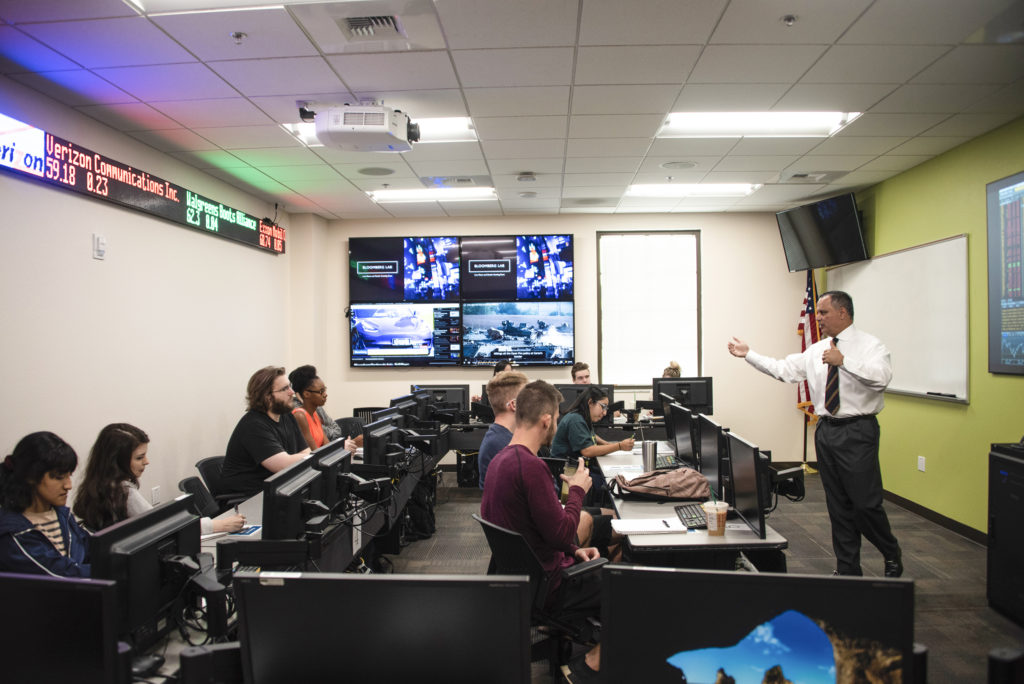
BENEFITS TO STUDENTS
With consolidation students now have access to more than 200 academic programs, seamless enrollment in courses at any one of the campuses and expanded social and cultural activities. The three student government associations (SGA) have merged into one organization that now advocates for all students instead of students at one campus.
“The merging of student government has been a real success,” said Student Governor Josh Ghansiam. “The leadership of SGA overall is standing behind us in building a student center and residence hall. It’s been great to see the students coming together to support one another and each campus as they have needs.”
THE IMPACT OF THE PANDEMIC
Excellent progress was being made in building the foundation of a new, consolidated university by the start of 2020; then the COVID-19 pandemic hit home in early March.
“The safety and well-being of our students, faculty and staff and their families has been and continues to be our top priority in making all of our decisions,” said Holbrook. “The first challenge was to transition courses to remote learning and working from home. Maintaining continuity of course delivery and connections among students, faculty and staff was very important.”
CAMPUS TOWN HALLS PROVIDE FORUM FOR SHARING
With so much change happening so quickly, Holbrook knew it was important to provide a forum to share accurate information with the campus community, and on March 27, she hosted the first virtual Town Hall meeting for all faculty and staff. During the next nine months, these virtual Town Halls – 28 in all – occurred nearly every Friday with between 125 and 150 attendees. Everyone on campus was invited to submit agenda items for discussion each week and faculty and staff were encouraged to celebrate achievements by giving “Shout Outs” to their peers who were doing outstanding while working virtually.
Holbrook also tried to mix in a little lightheartedness to the virtual gatherings, at times starting the meeting with photos of sea birds that visit her patio overlooking Sarasota Bay. But, make no mistake, the meetings reflected the seriousness of what was happening on the campuses and in the world. When racial tensions and civil unrest erupted in early summer, an internationally renowned expert on race relations, Dr. Jamie Washington, joined the campus Town Hall to facilitate a candid discussion on race and racism.
During one Town Hall later in the summer, Holbrook scrapped the agenda for the day and simply asked people how they were doing. For the next hour, faculty and staff shared the impact that the stress of quarantine and working remotely was having on them personally, along with the anxiety associated with potentially becoming infected. The ongoing civil and political unrest also were taking a toll on many, so a half-day Town Hall was dedicated to “Health, Healing and Self-Care” and was greatly appreciated by participants.
In addition to these special Town Halls, many other leaders from USF joined the weekly Sarasota-Manatee meetings to provide updates on the work of the Coronavirus Task Force charged with managing safety and campus logistics during the pandemic, best practices in utilizing technology, and vaccine development to name a few topics of discussion.
“The Town Hall meetings provide an opportunity for all campus stakeholders to share useful information that benefits everyone, especially during the pandemic,” said Denise Davis-Cotton, chair of the Staff Advisory Council (SAC). “This is a strong and vibrant communication network and SAC is delighted to be included in the meetings. I particularly enjoy listening to the “Shout-outs” that highlight the achievements and accomplishments across campus and have enjoyed getting to know colleagues on a deeper level.”
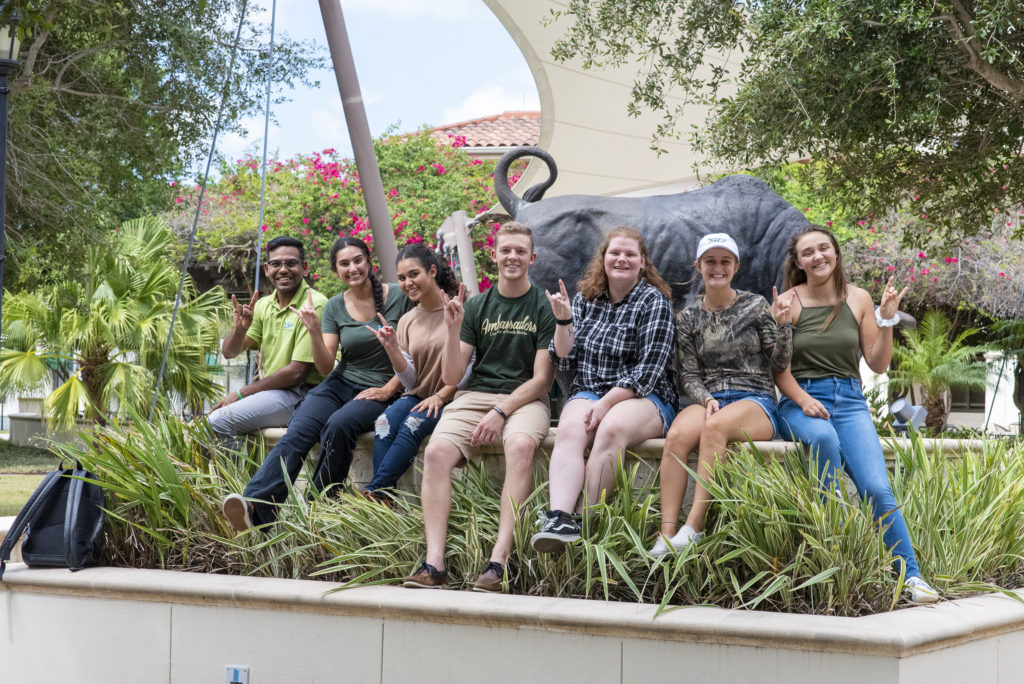
CALLING ALL STUDENTS
Another important strategy to keep students connected and on track to graduation was a call-out program implemented by academic support specialists within the Office of Academic Affairs and Student Success under the leadership of Dr. Brett Kemker. Three staff members made several rounds of phone calls to approximately 1,860 students to check on their welfare and make sure they were aware of resources that could help them succeed in their classes and stay on course to graduation.
“We felt like it was really important to reach out to our students personally to make sure they were doing okay health wise, and offer any support we may be able to provide to help them succeed in their courses,” said Kemker. “We are extremely proud of our students who have shown such resiliency to stay on track to graduation and complete their degrees.”
“Consolidation was bringing us together because it was necessary to complete the task; Coronavirus brought us together on a deeper, more personal level and I believe these relationships are positioning us for even greater success as a University in the years ahead,” said Holbrook.
BRUNCH ON THE BAY:
Highlights Community Support
For more than 26 years, the USF Sarasota-Manatee campus has hosted one of the region’s premier social events of the season, Brunch on the Bay. The extravaganza brings the community together for delectable cuisine provided by some of the area’s top restaurants and caterers and provides an opportunity for businesses and individuals to support much-needed student scholarships.
Unfortunately, due to the coronavirus pandemic, USF was forced to postpone, then ultimately cancel, Brunch on the Bay for the first time since the event began in 1994. Plans are in the works to bring the event back to campus on Nov. 7, 2021.
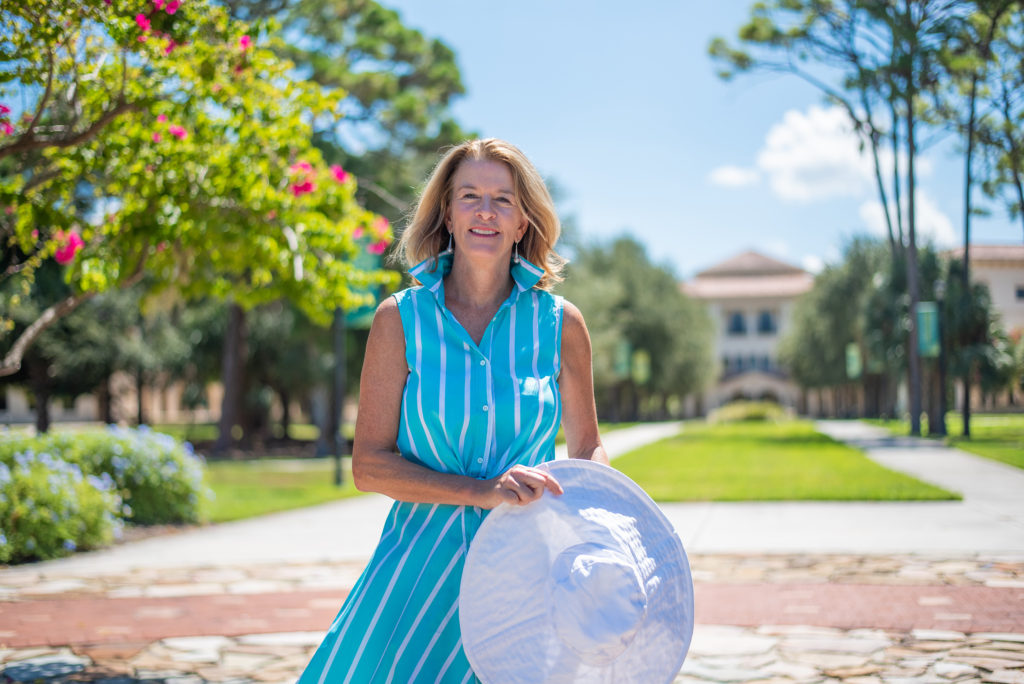
“We were really hoping to be able to host Brunch on the Bay on the Sarasota-Manatee campus through a hybrid format in January, but unfortunately we need to push the event back to November,” said Lee Williams, regional vice chancellor for Advancement. “Brunch is a wonderful event because it brings our community together to showcase and support our students who are such an important part of our shared future.”
“We are so pleased that many of our sponsors, including our title sponsor, the USF Federal Credit Union, have chosen to continue supporting student scholarships this year even though we could not hold the event as originally planned. We also want to thank Mary Kenealy Events for all of their efforts to stage the event.”
“It is an honor and privilege to give back to the university through these scholarships,” said USF Federal Credit Union CEO and President Richard J. Skaggs. “After all, supporting the educational advancement of future leaders is one of the best investments we could make.”
Event chair Elizabeth Moore, a local philanthropist and environmentalist, agreed. “USF trains students to become outstanding professionals in our community and supports critical issues that impact our growth and future. There’s a young, vibrant energy here and these students need our support now more than ever.”
For more information, please visit sarasotamanatee.usf.edu/brunch or call 914-359-4603.



You must be logged in to post a comment Login